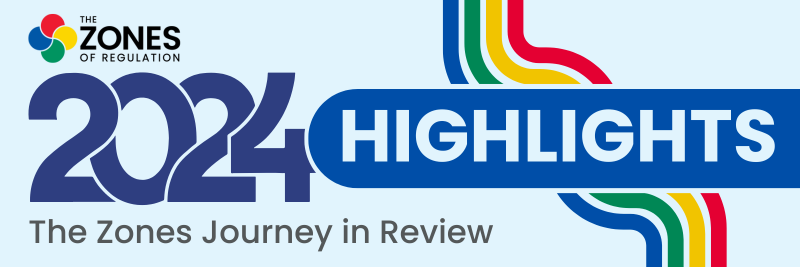This blog is an excerpt from the Adult Learning Modules in The Zones of Regulation Digital Curriculum and the Getting Into The Zones of Regulation curriculum companion guide.
Understanding Executive Functioning
Sometimes referred to as cognitive control, executive functioning (EF) is a general term that describes the cognitive processes involved in the conscious control of thoughts and actions that help us accomplish our goals. In other words, it’s the thinking behind the doing that takes place in the pre-frontal cortex located in the “upstairs brain” responsible for more complex thought. Executive functioning is like a command or control center, the ‘CEO’ of our brains, that oversees our behavior and mental operations.
Key Cognitive Processes in Executive Functioning
Numerous mental operations fall under EF. Some that are influential in developing more metacognitive self-regulatory capacity are:
- Working memory: Accessing, updating, and purging “information files” in the brain. This helps us use past experiences to guide our thinking, actions, and reactions.
- Inner speech: Using self-talk, interpersonal dialogues, and reflection.
- Flexibility: Considering multiple options and applying different rules in different settings.
- Planning: Organizing actions and executing a plan to reach desired goals.
- Response inhibition: Setting priorities, motivation, and resisting impulses.
- Attention shifting: Attending to two or more activities simultaneously, such as taking notes while listening to a lecture.
- Goal-directed persistence: Working toward a goal despite hurdles and distractions.
- Problem solving: Brainstorming solutions and identifying the best option.
Development of Executive Functions
Peg Dawson and Richard Guare, experts in EF and authors of Executive Functioning Skills in Children and Adolescents 3rd Ed. (2018) points out, “these skills, which are at the heart of self-regulation and self-control, unfold over time and continue to develop well into adolescence and early adulthood.” As these executive functions develop, learners become better equipped for the metacognitive thinking and problem solving necessary to overcome the challenges they meet and better equipped to regulate the emotions they experience.
For example, consider a 3rd grader, who often responds to school stressors, such as challenging work or a redirection by a teacher, with an impulsive swiping of the contents off their table or desk. Perhaps their self-talk was defeating: “I’m so stupid.” Then, over the course of the school year, their teacher actively supports them to understand that their self-talk wasn’t helping and taught them to replace it with a more nurturing voice, “this is hard, I can take a break” (using inner speech). Over time and with frequency, this learner can be taught to develop new metacognitive strategies to help catch and override the impulse to swipe the table clear when frustrated (response inhibition).
Through exploration and with practice, nearly all learners can become more skilled in accessing and using regulation tools (requiring problem solving, planning and goal-directed persistence) to manage their feelings.
Building Executive Functioning Skills with The Zones of Regulation
The Zones of Regulation curriculum helps learners to develop self-awareness, purposeful decision-making, and healthy regulation strategies, all of which support executive functioning. As Zones leaders, you can build strategies that support executive functioning into your daily routine. This can be as simple as building regulation Zones Check-Ins into your schedule with a Zones visual for reference, using a Zones Toolbox to support learners in choosing a tool, and making a regulation plan for common triggers along with learners. These strategies cultivate learners’ agency to manage their thoughts, feelings, actions, and ultimately their well-being.
Want to learn more about the complex processes behind regulating the brain and body? Join our experts in The Zones Comprehensive Training, live or on-demand!




